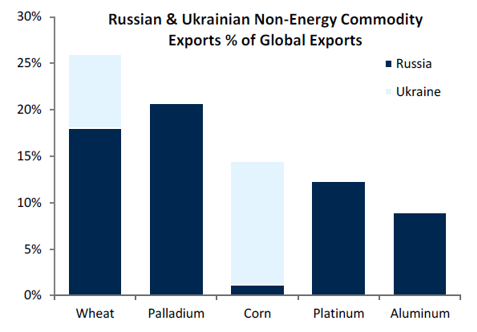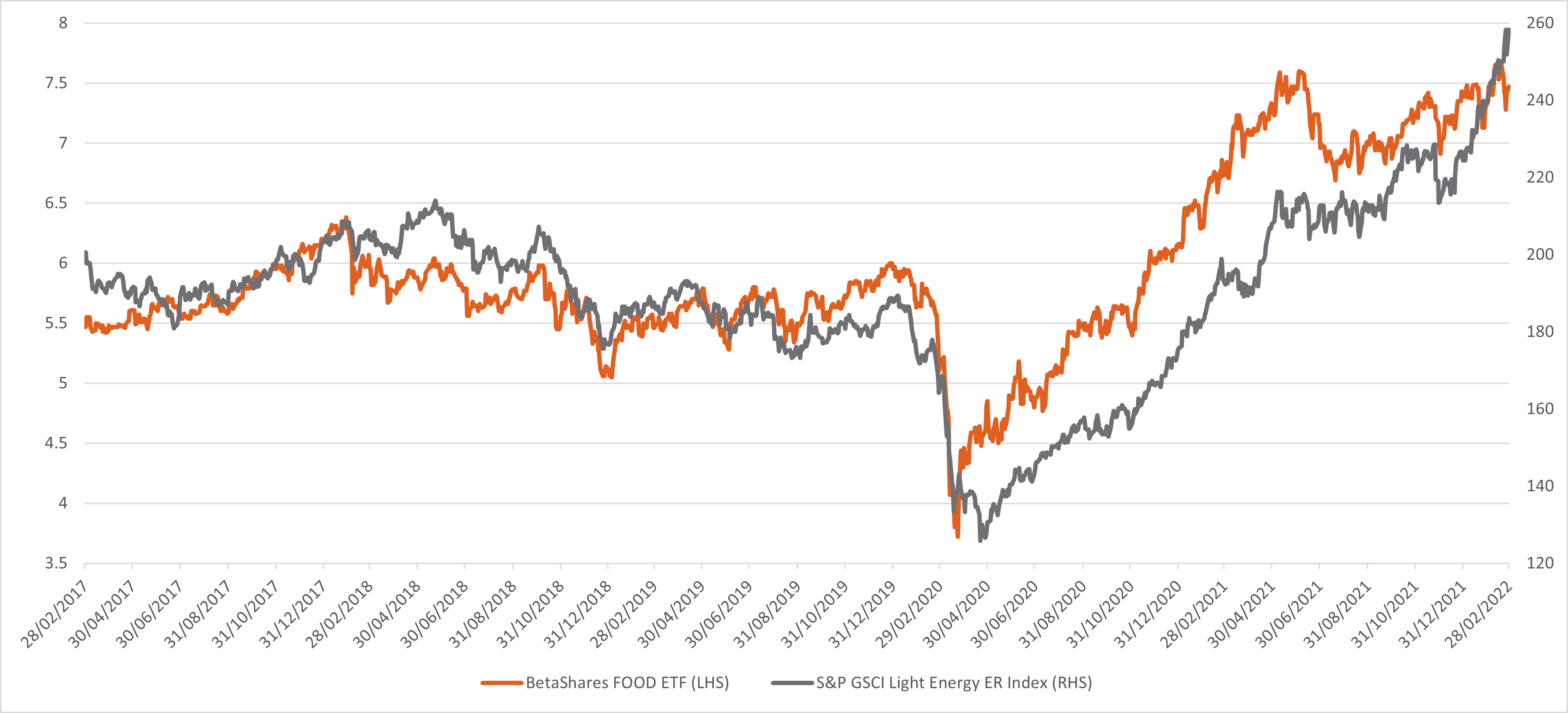Commodities: Does the Russia/Ukraine conflict reinforce the bull case?

Betashares
History tells us that geopolitics rarely matters for markets, except when it does, and then it’s the only thing that matters. Recent announcements from Western officials were significant and historic, and countered the prevailing belief among analysts that the West wouldn’t risk short-term economic pain in order to damage the Russian war effort.
The medium-term implications of an escalation in military activity are a potential increase in fiscal spending from major powers and, with it, a further inflationary impulse. However, the footprint the region has in the global commodities markets and the implications of major disruption to energy and agricultural production and supply could reinforce the existing case for commodities markets broadly.
The bull case for commodities
- Commodities are broadly considered one of the best inflation hedges amongst conventional assets and have historically tended to show a low correlation with traditional assets, during hiking cycles.
- Demand for commodities has remained strong and is now above pre-pandemic levels, with China having recently restarted stimulus in response to weak data and the European fiscal recovery fund now being spent.
- Inventories are extremely tight, the lowest since 1990, with minimal spare production capacity. The ability for supply to respond is limited, due to a lack of capital investment across commodity sectors.
- The slow supply response is arguably structural not cyclical. Amongst other factors, the rise of ESG considerations has limited the availability of capital for capex investment needed to increase supply capacity to meet future demand. It has also likely raised the price level required to attract new investment. This is particularly the case in US shale, which has effectively placed a ceiling on the oil price over the last decade.
Ukraine/Russia – Commodity supply shock
Together, Russia and Ukraine represent the world’s largest wheat export bloc with a more than 25% share of global wheat exports, while Ukraine alone accounts for almost 15% of global corn exports. Unlike energy, where there remains some, albeit limited, ability for a supply response, there simply isn’t the ability for agricultural supply to ramp up if Europe’s breadbasket is removed from the map (Ukraine’s planting season is weeks away from commencing). This is particularly so if key shipping zones for agricultural commodities (i.e. the Black Sea) become flashpoints. Thus, any ongoing war-related disruptions to supply could put further upward pressure on already high world food prices – which in turn could boost profits for producers.

The BetaShares Global Agriculture Companies ETF – Currency Hedged (ASX: FOOD) provides exposure to a globally diversified portfolio of the largest 60 companies involved in agriculture and farming, with agriculture companies historically having been highly correlated to broad commodities and arguably one of the better investible proxies to broad commodity prices. The chart below demonstrates this correlation. FOOD also has an investment case as an inflation play, should the current situation lead to central banks tolerating above-target inflation expectations for a while longer.
FOOD vs S&P GSCI Light Energy Index (broad commodity futures index):
.png)
Beyond soft commodities, crude oil prices have now broken $100 per barrel for the first time since 2014. While there are yet to be direct sanctions on Russian commodities, the hurdles that restrictions on Russian access to the SWIFT international payment system have created are already exacerbating the current supply shock. For oil, Goldman Sachs estimates that this represents $110/bbl to $120/bbl short term price upside. Russia typically export about 7.3 million barrels a day of seaborne crude oil and petroleum products – exports that are now shut. Tuesday’s announcement by the IEA that they will be releasing 60mb of emergency oil reserves covers only a third of a one-month disruption to Russian seaborne oil. The only other potential short term supply response available would be from OPEC, which would come at the expense of a ‘complete depletion’ of the global oil market’s spare capacity, potentially pushing prices further higher.
Though we would note the stock specific risks and need for diversification when investing in global equities in the current environment, some of which may have exposure to Russian assets, the BetaShares Global Energy Companies ETF – Currency Hedged (ASX: FUEL) provides exposure to the largest 60 global energy companies (excluding companies listed in Australia). This includes a high concentration to energy ‘supermajors’ including Exxon Mobil (8.1%), Chevron (7.8%), Total S.E. (7.2%) and Royal Dutch Shell (5.6%) (as at 31st December).

Exposure to the price of crude oil futures can be accessed through the BetaShares Crude Oil Index ETF – Currency Hedged (Synthetic) (ASX: OOO). We note that the futures curve is currently in backwardation and not in contango, and when investing in futures-based products we advise investors to monitor the structure of the forward curve.

For those who prefer regional exposure, the BetaShares FTSE 100 ETF (ASX: F100) provides a more meaningful exposure to the energy sector relative to other developed market indices.

Learn more
ETFs are one of the fastest growing investment vehicles in the Australian market. For a full range of products available to investors, please visit BetaShares website.
2 topics
4 stocks mentioned
3 funds mentioned

Adam is a member of the BetaShares Distribution team responsible for supporting Institutional and Intermediary Broker channels, as well as supporting the firm’s capital markets activities. Prior to joining BetaShares Adam worked in stockbroking...

Adam is a member of the BetaShares Distribution team responsible for supporting Institutional and Intermediary Broker channels, as well as supporting the firm’s capital markets activities. Prior to joining BetaShares Adam worked in stockbroking...
